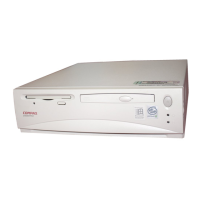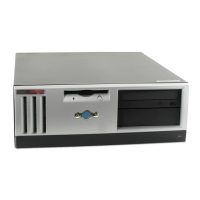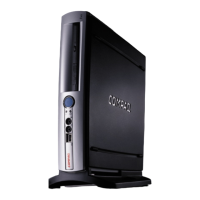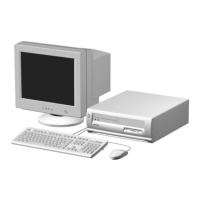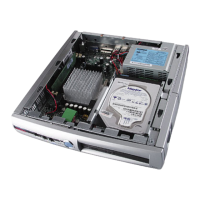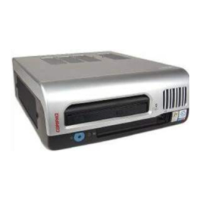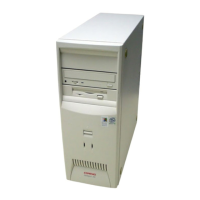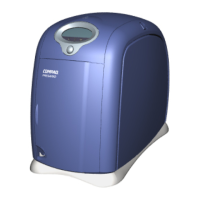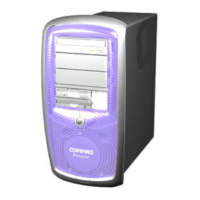Do you have a question about the Compaq EN Series and is the answer not in the manual?
Provides technical information about Compaq Deskpro EN Series PCs. Covers system design, function, and features.
Explains how values, ranges, signal labels, register notation, and bit notation are presented.
Lists acronyms and abbreviations used throughout the guide for clarity and quick reference.
Introduces the Compaq Deskpro EN Series, highlighting manageability, performance, and compatibility.
Details standard features included on all models and available optional components.
Illustrates the mechanical particulars of the bezel, chassis, and major board assemblies for desktop and minitower forms.
Explains the system's architecture, including buses like PCI, AGP, and ISA, and key components.
Presents environmental, electrical, and physical specifications for the Compaq DESKPRO EN Series PCs.
Introduces the chapter's focus on the processor/cache memory subsystem and system memory configurations.
Details the processor and memory subsystem architecture, including North Bridge and memory buses.
Introduces system architecture topics, covering PCI, AGP, ISA buses, clock distribution, and system management.
Describes the PCI bus in general and its implementation, including devices, functions, and transactions.
Explains the Accelerated Graphics Port (AGP) bus, designed for high-performance 3D graphics adapters.
Details the Industry Standard Architecture (ISA) bus, an 8-/16-bit path for standard I/O peripherals.
Explains how system board clock signals are generated and distributed using a Cypress CY2280 or compatible part.
Describes the PC87307 I/O controller's functions for the Real-time clock and configuration memory.
Covers system I/O map and register accessing, detailing GPIO utilization and controller functions.
Describes hardware support for security, safety, identification, and power consumption via System Security ASIC.
Introduces system interfaces, discussing I/O porting controlled by south bridge and I/O controller registers.
Explains the enhanced IDE interface, including primary/secondary controllers, data connectors, and programming.
Details the diskette drive interface, supporting up to two drives and integrated into the 87307 I/O controller.
Describes serial interfaces for asynchronous data transmission using 16550/16450-compatible UARTs and DB-9 connectors.
Covers the parallel interface for peripheral connection, supporting SPP, EPP, and ECP modes.
Explains the interface for enhanced keyboards and mice using PS/2-type connections and the 87307 I/O controller.
Details the Universal Serial Bus (USB) interface providing up to 12 Mb/s data transfers for peripherals.
Introduces the audio subsystem featuring Compaq Premier Sound, compatible with industry standards.
Provides a block diagram and description of the audio subsystem's architecture and analog interfaces.
Covers programming aspects of the audio subsystem, including configuration and control registers.
Lists the technical specifications for the audio subsystem, including sampling rate and output power.
Introduces the chapter on power supply and distribution methods for the Compaq Deskpro PC.
Details the power supply assembly, its control via programmable logic, and power button functionality.
Explains the distribution of +3.3 VDC, +5 VDC, -5 VDC, +12 VDC, and -12 VDC to system components.
Illustrates general signal distribution between main system unit subassemblies.
Introduces the BIOS ROM, its functions like POST, PCI initialization, and Plug 'n Play support.
Covers system boot functions, including boot block, QuickBoot, SilentBoot, and system resets.
Explains the Serial Presence Detect (SPD) method for determining installed DIMM configuration.
Details Desktop Management functions provided by BIOS INT 15, covering security, identification, and system management.
Describes the BIOS Plug 'n Play (PnP) support for PnP version 1.0A and its functions.
Covers power management support types: independent PM, APM, and ACPI support.
Describes the standard Compaq keyboard, its compliance, and features like cursor keys and function keys.
Explains the functional block diagram of keystroke processing and how Make/Break codes are generated.
Introduces the Compaq 10/100 TX PCI Intel WOL UTP Controller card and its key features.
Details the card's components, including the 82558 controller, LEDs, WOL header, and RJ-45 connector.
Introduces the Adaptec AHA-2940UW SCSI Host Adapter PCI peripheral for high-performance SCSI interfacing.
Describes the card's architecture based on the AIC-7880 SCSI controller and its features.
Explains how the Adaptec AHA-2940U SCSI Adapter Card is configured using PCI protocol and registers.
Lists the operating specifications for the Ultra SCSI Host Adapter Card.
Provides guidelines for using the adapter card with SCSI devices, including termination and connectors.
Shows the pinout for the Ultra SCSI Connector (50-pin) and Wide Ultra SCSI Connector (68-pin).
Introduces ATI RAGE PRO AGP Graphics Cards based on the ATI RAGE PRO controller.
Details the ATI RAGE PRO AGP controller's features for 2D and 3D processing.
Lists the graphics modes supported by the ATI RAGE PRO AGP cards for standard and expanded memory.
Explains how the graphics card is configured and controlled using PCI configuration registers and VGA modes.
Describes how the controller provides monitor power control using VESA DPMS and HSYNC/VSYNC signals.
Details the connectors associated with the graphics subsystem: display/monitor, AMC, and SODIMM.
| Graphics | Integrated ATI Rage Pro (some models) or optional AGP graphics card |
|---|---|
| Operating System | Windows 95/98/NT |
| CPU | Intel Celeron |
| Memory Type | SDRAM |
| Processor | Intel Celeron |
| Optical Drive | CD-ROM or DVD-ROM |
| Ports | Serial, Parallel, USB, VGA |
